情态动词的详细用法归纳
(完整版)情态动词详细用法归纳
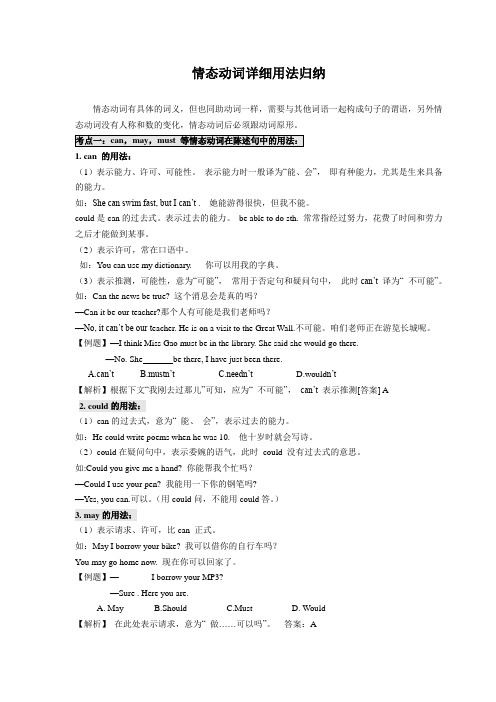
情态动词详细用法归纳情态动词有具体的词义,但也同助动词一样,需要与其他词语一起构成句子的谓语,另外情态动词没有人称和数的变化,情态动词后必须跟动词原形。
1. can 的用法:(1)表示能力、许可、可能性。
表示能力时一般译为“能、会”,即有种能力,尤其是生来具备的能力。
如:She can swim fast, but I can’t . 她能游得很快,但我不能。
could是can的过去式。
表示过去的能力。
be able to do sth. 常常指经过努力,花费了时间和劳力之后才能做到某事。
(2)表示许可,常在口语中。
如:You can use my dictionary. 你可以用我的字典。
(3)表示推测,可能性,意为“可能”,常用于否定句和疑问句中,此时can’t 译为“ 不可能”。
如:Can the news be true? 这个消息会是真的吗?—Can it be our teacher?那个人有可能是我们老师吗?—No, it can’t be our t eacher. He is on a visit to the Great Wall.不可能。
咱们老师正在游览长城呢。
【例题】—I think Miss Gao must be in the library. She said she would go there.—No. She be there, I have just been there.A.can’tB.mustn’tC.needn’tD.would n’t【解析】根据下文“我刚去过那儿”可知,应为“ 不可能”,can’t 表示推测[答案] A2. could的用法:(1)can的过去式,意为“ 能、会”,表示过去的能力。
如:He could write poems when he was 10. 他十岁时就会写诗。
(2)could在疑问句中,表示委婉的语气,此时could 没有过去式的意思。
情态动词主要用法总结

情态动词主要用法总结情态动词是用来表示说话人的态度、情感或意愿的动词。
情态动词有can、could、may、might、shall、should、will、would、must、need 等。
以下是情态动词的主要用法总结:1.表示能力:- Can:表示一般的能力或技能,意为“能够”。
- Could:表示过去的能力或技能,意为“能够”。
2.表示许可或允许:- Can:表示一般的许可或允许,意为“可以”。
- May:表示正式的或礼貌的许可,意为“可以”。
3.表示可能性:- May:表示可能性较大,意为“可能”。
- Might:表示可能性较小,意为“可能”。
4.表示意愿或请求:- Shall:用于第一人称中,表示提议、请求或建议,意为“将”。
- Should:用于第一人称或第三人称中,表示忠告、建议或期望,意为“应该”。
- Will:用于第一人称和第三人称中,表示意愿、决心或承诺,意为“将”。
- Would:用于第一人称和第三人称中,表示客气的请求、建议或愿望,意为“将”。
5.表示必要性或推测:- Must:表示必须性或应该性,意为“必须”。
- Should:表示推测、猜测或可能性较大的必要性,意为“应该”。
6.表示时间或条件:- Will/Would:表示未来时间或条件,意为“将/将会”。
7.表示推测或假设:- Must:表示肯定的推测,意为“一定”。
- May/Might:表示可能的推测,意为“可能”。
需要注意的是,情态动词本身没有人称和数的变化,后面的动词应为原形。
另外,他们常常与动词的原形连用构成谓语,可以用于各种句型,例如肯定句、否定句、疑问句等。
情态动词用法总结

情态动词用法总结情态动词,又称情态助动词,是英语中一类特殊的助动词,包括can、could、may、might、must、shall、should、will、would等。
它们通常与动词原形搭配使用,用来表示说话人对动作或状态的态度、推测、许可、义务、建议等。
下面将分别从这几个方面进行总结情态动词的用法。
1. 表示能力和才能:can、could和able to都可以表示能力和才能,但用法稍有不同。
can和able to可以用来表示现在或将来的能力,而could则表示过去的能力或偶然的能力。
例如:- I can swim.(我会游泳)- She could speak three languages when she was 15.(她15岁时会说三种语言)- He was able to finish the task on time.(他能够按时完成任务)2. 表示推测和可能性:may、might和could可用来表示推测和可能性,其中may比might更常用,could表示可能性最低。
例如:- He may be at home.(他可能在家)- It might rain this afternoon.(今天下午可能会下雨)- She could be in the library.(她有可能在图书馆)3. 表示许可和禁止:can、could和may可用来表示许可,could表示客气一些。
而mustn't则表示禁止。
例如:- You can go now.(你可以走了)- Could I use your computer?(我能用一下你的电脑吗?)- You mustn't smoke here.(你不能在这里抽烟)4. 表示义务和必要性:must表示主观上的义务和必要性,常用来表示说话人的主观判断。
have to则表示客观上的必要性和强制性。
例如:- I must finish my homework tonight.(我必须今晚完成作业)- I have to get up early tomorrow.(我明天必须早起)5. 表示建议和推荐:should和ought to都表示建议或推荐,should更常用一些,ought to用得相对较少。
情态动词的用法完整详细
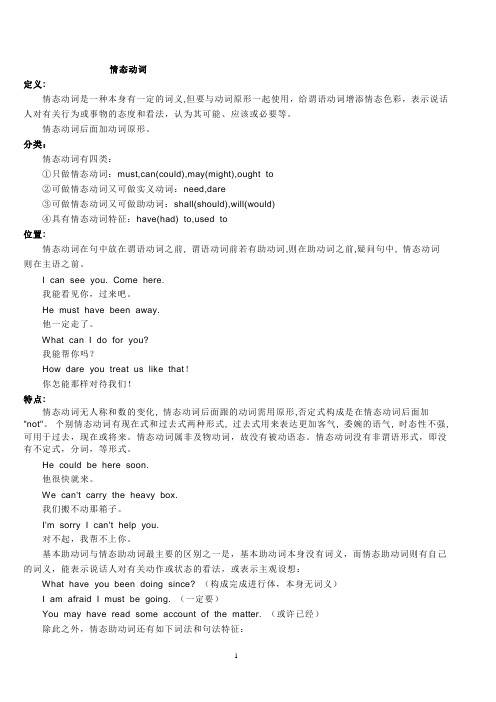
情态动词定义:情态动词是一种本身有一定的词义,但要与动词原形一起使用,给谓语动词增添情态色彩,表示说话人对有关行为或事物的态度和看法,认为其可能、应该或必要等。
情态动词后面加动词原形。
分类:情态动词有四类:①只做情态动词:must,can(could),may(might),ought to②可做情态动词又可做实义动词:need,dare③可做情态动词又可做助动词:shall(should),will(would)④具有情态动词特征:have(had) to,used to位置:情态动词在句中放在谓语动词之前, 谓语动词前若有助动词,则在助动词之前,疑问句中, 情态动词则在主语之前。
I can see you. Come here.我能看见你,过来吧。
He must have been away.他一定走了。
What can I do for you?我能帮你吗?How dare you treat us like that!你怎能那样对待我们!特点:情态动词无人称和数的变化, 情态动词后面跟的动词需用原形,否定式构成是在情态动词后面加"not"。
个别情态动词有现在式和过去式两种形式, 过去式用来表达更加客气, 委婉的语气, 时态性不强, 可用于过去,现在或将来。
情态动词属非及物动词,故没有被动语态。
情态动词没有非谓语形式,即没有不定式,分词,等形式。
He could be here soon.他很快就来。
We can't carry the heavy box.我们搬不动那箱子。
I'm sorry I can't help you.对不起,我帮不上你。
基本助动词与情态助动词最主要的区别之一是,基本助动词本身没有词义,而情态助动词则有自己的词义,能表示说话人对有关动作或状态的看法,或表示主观设想:What have you been doing since? (构成完成进行体,本身无词义)I am afraid I must be going. (一定要)You may have read some account of the matter. (或许已经)除此之外,情态助动词还有如下词法和句法特征:1)除ought和used以外,其他情态动词后面只能接不带to的不定式。
情态动词用法归纳(全)
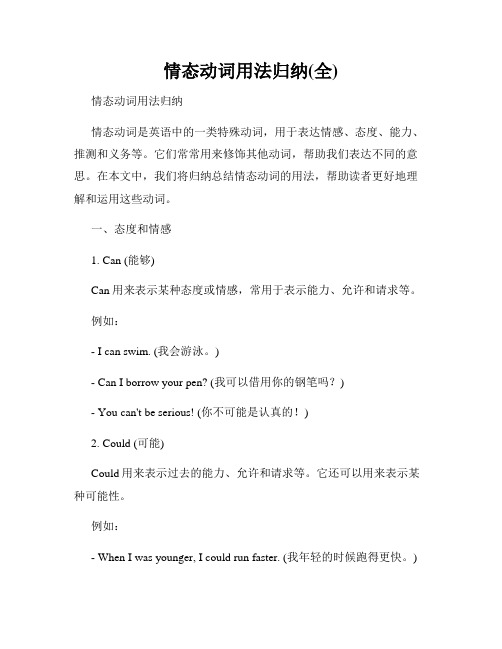
情态动词用法归纳(全)情态动词用法归纳情态动词是英语中的一类特殊动词,用于表达情感、态度、能力、推测和义务等。
它们常常用来修饰其他动词,帮助我们表达不同的意思。
在本文中,我们将归纳总结情态动词的用法,帮助读者更好地理解和运用这些动词。
一、态度和情感1. Can (能够)Can用来表示某种态度或情感,常用于表示能力、允许和请求等。
例如:- I can swim. (我会游泳。
)- Can I borrow your pen? (我可以借用你的钢笔吗?)- You can't be serious! (你不可能是认真的!)2. Could (可能)Could用来表示过去的能力、允许和请求等。
它还可以用来表示某种可能性。
例如:- When I was younger, I could run faster. (我年轻的时候跑得更快。
)- Could I ask you a question? (我可以问你一个问题吗?)- It could rain later, so bring an umbrella. (今天后面可能会下雨,所以带上雨伞。
)3. May (可能)May常表示许可、请求和推测等。
它还可以用来表示某种可能性或希望。
例如:- May I use your phone? (我可以用一下你的手机吗?)- It may rain tomorrow. (明天可能会下雨。
)- They may arrive late. (他们可能会迟到。
)4. Might (可能)Might与may的用法类似,但表示的可能性稍微低一些。
例如:- She might be busy. (她可能很忙。
)- I might go to the party, but I'm not sure yet. (我可能会去参加派对,但我还不确定。
)二、能力和推测1. Must (必须)Must用来表示强烈的推断或必要性。
情态动词的用法完整详细

情态动词的用法完整详细情态动词定义:情态动词是一种本身有一定的词义,但要与动词原形一起使用,给谓语动词增添情态颜色,表示说话人对有关行为或事物的态度和看法,认为其可能、应当或须要等。
情态动词后面加动词原形。
分类:情态动词有四类:①只做情态动词:must,can(could),may(might),ought to①可做情态动词又可做实义动词:need,dare①可做情态动词又可做助动词:shall(should),will(would)①具有情态动词特征:have(had) to,used to位置:情态动词在句中放在谓语动词之前, 谓语动词前若有助动词,则在助动词之前,疑问句中, 情态动词则在主语之前。
I can see you. Come here.我能看见你,过来吧。
He must have been away.他一定走了。
What can I do for you?我能帮你吗?How dare you treat us like that!你怎能那样对待我们!特点:情态动词无人称和数的变化, 情态动词后面跟的动词需用原形,否定式构成是在情态动词后面加"not"。
个别情态动词有现在式和过去式两种形式, 过去式用来表达越发客气, 委婉的语气, 时态性不强, 可用于过去,现在或未来。
情态动词属非及物动词,故没有被动语态。
情态动词没有非谓语形式,即没有不定式,分词,等形式。
He could be here soon.他很快就来。
We can't carry the heavy box.我们搬不动那箱子。
I'm sorry I can't help you.对不起,我帮不上你。
基本助动词与情态助动词最主要的区分之一是,基本助动词本身没有词义,而情态助动词则有自己的词义,能表示说话人对有关动作或状态的看法,或表示主观设想:What have you been doing since? (构成完成举行体,本身无词义)I am afraid I must be going. (一定要)You may have read some account of the matter. (或许已经)除此之外,情态助动词还有如下词法和句法特征:1)除ought和used以外,其他情态动词后面只能接不带to的不定式。
情态动词的用法
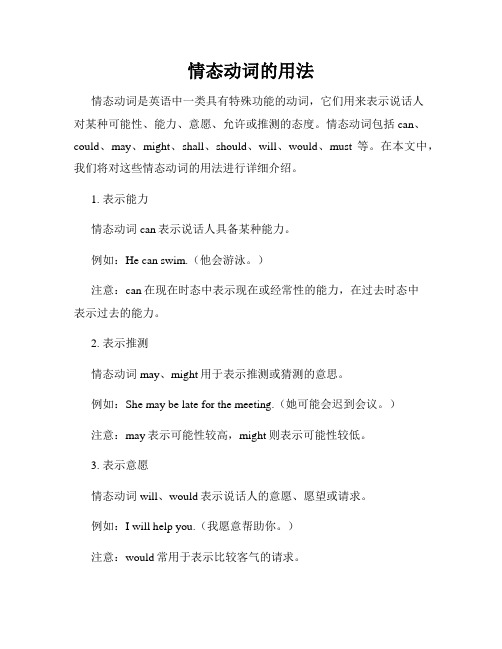
情态动词的用法情态动词是英语中一类具有特殊功能的动词,它们用来表示说话人对某种可能性、能力、意愿、允许或推测的态度。
情态动词包括can、could、may、might、shall、should、will、would、must等。
在本文中,我们将对这些情态动词的用法进行详细介绍。
1. 表示能力情态动词can表示说话人具备某种能力。
例如:He can swim.(他会游泳。
)注意:can在现在时态中表示现在或经常性的能力,在过去时态中表示过去的能力。
2. 表示推测情态动词may、might用于表示推测或猜测的意思。
例如:She may be late for the meeting.(她可能会迟到会议。
)注意:may表示可能性较高,might则表示可能性较低。
3. 表示意愿情态动词will、would表示说话人的意愿、愿望或请求。
例如:I will help you.(我愿意帮助你。
)注意:would常用于表示比较客气的请求。
4. 表示推测的过去情态动词must常用于表示对过去情况的推测或肯定。
例如:He must have missed the bus.(他肯定错过了公交车。
)注意:must用于表示对过去情况的肯定,而might用于表示对过去情况的推测。
5. 表示义务或必要性情态动词must表示对义务、必要性或确定性的肯定。
例如:You must finish your homework.(你必须完成作业。
)6. 表示建议或应该情态动词should表示建议或应该。
例如:You should go to bed early.(你应该早点睡觉。
)注意:should还可以表示对过去情况的推测,例如:He should have arrived by now.(他现在应该已经到达了。
)7. 表示允许或许可情态动词can与may可以用于表示许可或允许。
例如:Can I borrow your pen?(我可以借你的钢笔吗?)8. 表示可能性情态动词could用于表示可能性。
情态动词用法总结

情态动词用法总结情态动词是表示一种情态、态度或推测的动词。
常见的情态动词有can、could、may、might、must、shall、should、will、would等。
1. 表示能力和可能性- Can和could用来表示能力或可能性,can用于现在时,could 用于过去时。
- I can swim.(我会游泳。
)- He could speak three languages when he was young.(他年轻时会说三种语言。
)- May和might用来表示可能性,may用于现在时,might用于过去时。
- It may rain later.(可能会下雨。
)- He said he might come to the party.(他说过可能来参加派对。
)2. 表示推测和猜测- Must用来表示非常有把握的推测。
- He must be at home because his car is in the driveway.(他一定在家,因为他的车停在了车道上。
)- Should用来表示期望或推荐。
- You should apologize for your behavior.(你应该为你的行为向别人道歉。
)3. 表示义务和答应- Must和have to用来表示义务或必须做的事情。
- You must finish your homework before you watch TV.(你必须在看电视之前完成作业。
)- I have to go to work early tomorrow.(我明天必须早点去上班。
)- Shall和will用来表示答应或将要发生的事情。
- I shall/will help you with your project.(我会帮你做你的项目。
)4. 表示许可和请求- Can和could用来表示许可和请求。
- Can I use your phone?(我能用一下你的手机吗?)- Could you please pass me the salt?(你能请帮我递一下盐吗?)总结情态动词的用法:1. 表示能力和可能性的:can/could, may/might2. 表示推测和猜测的:must, should3. 表示义务和答应的:must, have to, shall/will4. 表示许可和请求的:can/could需要注意的是,情态动词本身没有人称和数的变化,不进行时态的变化,而且后面的动词用原形。
情态动词的用法归纳
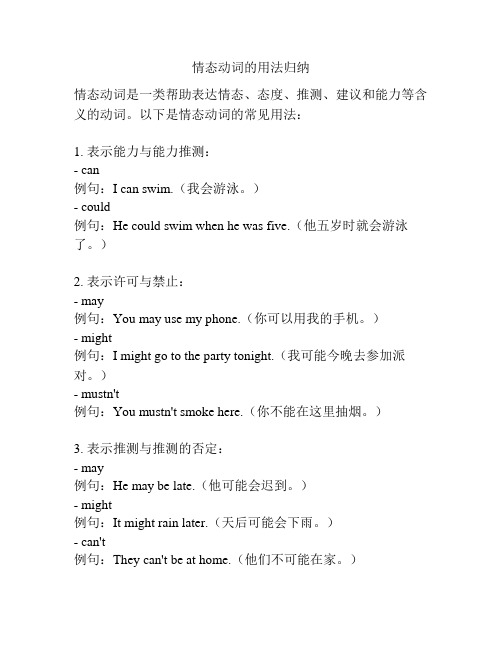
情态动词的用法归纳情态动词是一类帮助表达情态、态度、推测、建议和能力等含义的动词。
以下是情态动词的常见用法:1. 表示能力与能力推测:- can例句:I can swim.(我会游泳。
)- could例句:He could swim when he was five.(他五岁时就会游泳了。
)2. 表示许可与禁止:- may例句:You may use my phone.(你可以用我的手机。
)- might例句:I might go to the party tonight.(我可能今晚去参加派对。
)- mustn't例句:You mustn't smoke here.(你不能在这里抽烟。
)3. 表示推测与推测的否定:- may例句:He may be late.(他可能会迟到。
)- might例句:It might rain later.(天后可能会下雨。
)- can't例句:They can't be at home.(他们不可能在家。
)4. 表示义务与责任:- must例句:We must finish our homework.(我们必须完成作业。
)- have to例句:I have to go to work early tomorrow.(我明天必须早点去上班。
)5. 表示愿望与建议:- should例句:You should exercise regularly.(你应该经常锻炼。
)- ought to例句:They ought to help others.(他们应该帮助别人。
)6. 表示推荐与要求:- would like例句:I would like to have a cup of tea.(我想要一杯茶。
)- need例句:You need to finish this report by tomorrow.(你需要在明天之前完成这份报告。
情态动词的用法总结
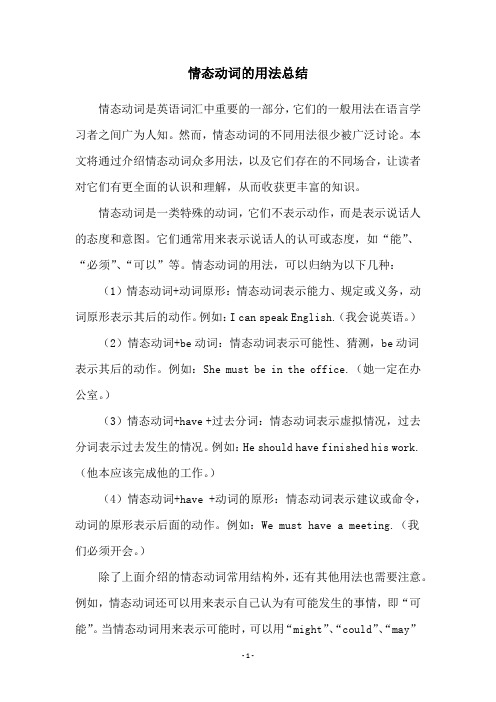
情态动词的用法总结情态动词是英语词汇中重要的一部分,它们的一般用法在语言学习者之间广为人知。
然而,情态动词的不同用法很少被广泛讨论。
本文将通过介绍情态动词众多用法,以及它们存在的不同场合,让读者对它们有更全面的认识和理解,从而收获更丰富的知识。
情态动词是一类特殊的动词,它们不表示动作,而是表示说话人的态度和意图。
它们通常用来表示说话人的认可或态度,如“能”、“必须”、“可以”等。
情态动词的用法,可以归纳为以下几种:(1)情态动词+动词原形:情态动词表示能力、规定或义务,动词原形表示其后的动作。
例如:I can speak English.(我会说英语。
)(2)情态动词+be动词:情态动词表示可能性、猜测,be动词表示其后的动作。
例如:She must be in the office.(她一定在办公室。
)(3)情态动词+have +过去分词:情态动词表示虚拟情况,过去分词表示过去发生的情况。
例如:He should have finished his work.(他本应该完成他的工作。
)(4)情态动词+have +动词的原形:情态动词表示建议或命令,动词的原形表示后面的动作。
例如:We must have a meeting.(我们必须开会。
)除了上面介绍的情态动词常用结构外,还有其他用法也需要注意。
例如,情态动词还可以用来表示自己认为有可能发生的事情,即“可能”。
当情态动词用来表示可能时,可以用“might”、“could”、“may”等表达。
例如:He might be able to help us.(他可能可以帮助我们。
)此外还可以使用“should”表示建议,它的否定形式“should not”可以表示禁止或劝阻。
例如:You should not go out after dark.(你晚上不应该出去。
)情态动词还可以用来表示让步,这时使用的情态动词一般是“could”或“would”。
情态动词的用法总结

情态动词的用法总结情态动词是英语中一种特殊的动词,它们不表示具体的动作,而是表示动作的程度、方式以及关系。
它们是由can、could、may、might、must、shall、should、would以及ought to组成的。
这些动词主要用来表示许可、虚拟、义务或建议。
尽管情态动词是一种特殊的动词,但它们仍然受到英语语法的约束,例如它们的形式要符合特定的情况。
一、Can的用法Can可以用来表示请求、许可、允许、可能性。
1.表示请求:Can I have a cup of tea?2.表示许可:You can go now.3.表示允许:You can watch TV after you finish your homework.4.表示可能性:It can rain tomorrow.Can在句中用作助动词,它的后面可以跟不定式或动词原形。
二、Could的用法Could可以用来表示请求、可能性、许可或建议。
1.表示请求:Could you pass me the salt?2.表示可能性:It could rain tomorrow.3.表示许可:You could go now.4.表示建议:You could go to the movie tonight.Could在句中用作助动词,它的后面可以跟不定式或动词原形。
三、May的用法May可以用来表示请求、允许、可能性或祝愿。
1.表示请求:May I have a cup of tea?2.表示允许:You may go now.3.表示可能性:It may rain tomorrow.4.表示祝愿:May you have a happy life.May在句中用作助动词,它的后面可以跟不定式或动词原形。
四、Might的用法Might可以用来表示可能性、习惯性的行为或请求。
1.表示可能性:It might rain tomorrow.2.表示习惯性的行为:He might come late.3.表示请求:Might I have a cup of tea?Might在句中用作助动词,它的后面可以跟不定式或动词原形。
情态动词用法归纳总结
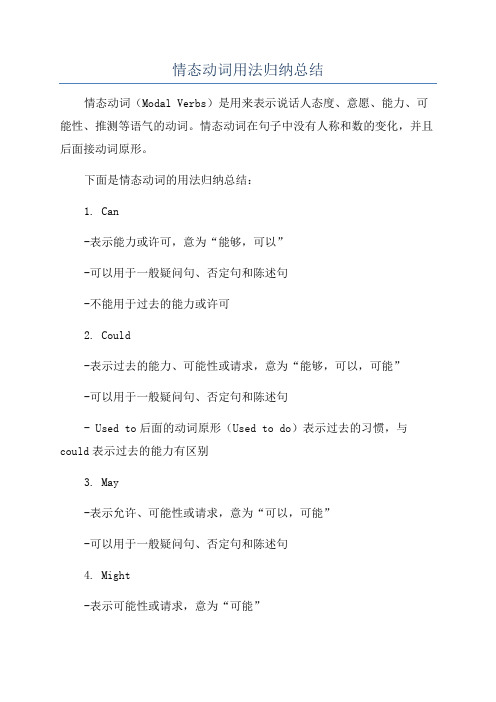
情态动词用法归纳总结情态动词(Modal Verbs)是用来表示说话人态度、意愿、能力、可能性、推测等语气的动词。
情态动词在句子中没有人称和数的变化,并且后面接动词原形。
下面是情态动词的用法归纳总结:1. Can-表示能力或许可,意为“能够,可以”-可以用于一般疑问句、否定句和陈述句-不能用于过去的能力或许可2. Could-表示过去的能力、可能性或请求,意为“能够,可以,可能”-可以用于一般疑问句、否定句和陈述句- Used to后面的动词原形(Used to do)表示过去的习惯,与could表示过去的能力有区别3. May-表示允许、可能性或请求,意为“可以,可能”-可以用于一般疑问句、否定句和陈述句4. Might-表示可能性或请求,意为“可能”-可以用于一般疑问句、否定句和陈述句5. Must-表示必须、推测或强烈的可能性,意为“必须,一定”-可以用于一般疑问句、否定句和陈述句6. Shall-表示将来的意愿或决定,意为“将,会”- 一般只用于第一人称(I和we)-可以用于一般疑问句、否定句和陈述句7. Should-表示应该、可能性或建议,意为“应该”-可以用于一般疑问句、否定句和陈述句8. Will-表示将来的意愿或决定,意为“将,会”-可以用于一般疑问句、否定句和陈述句9. Would-表示过去的习惯、虚拟语气或请求,意为“将,会,愿意”-可以用于一般疑问句、否定句和陈述句-用于主动语态时表示客气的请求或意愿,用于被动语态时表示过去的习惯10. ought to-表示应该,意为“应该”-用于一般疑问句、否定句和陈述句需要注意的是,情态动词后面的动词一般是不带to的原形形式。
有些情态动词的意思可能会根据上下文有所变化,所以具体使用时还需根据具体情况来判断。
10个重要情态动词用法详解

1. can⑴ 表示能力,一般译为“能、会”,尤其指生来具备的能力。
如:She can swim fast, but I can’t .⑵ 表示许可,常在口语中。
如: Youcanuse my dictionary.⑶表示推测,意为“可能”,常用于否定句和疑问句中,此时 can’t 译为“不可能”。
如:—Can the news be true? — No, it can’t be our teacher. He is on a visit to the Great Wal l.2. could⑴ can 的过去式,意为“能、会”,表示过去的能力。
如: He could write poems when he was 10.⑵ could 在疑问句中,表示委婉请求的语气,此时 could 没有过去式的意思。
如:Could you do me a favour?—Could I use your pen? —Yes, youcan. (注意回答)3. may⑴ 表示请求、许可,比 can 正式,如: May I borrow your bike? Youmay gohomenow.⑵ 表示推测,谈论可能性,意为“可能,或许”,一般用于肯定句中。
如: Itmay raintomorrow . Shemay be at home.⑶ may 的过去式为 might。
might 也可以表示可能性低于 may (此时 might 没有过去式的意思)。
如: He is away from school. He might be sick.⑷ 表示希望、祈求、祝愿,常可译为“祝愿”。
通常是用 may +主+V如: May you have a good time.May you be happy!May you succeed !4. must⑴ must 表示主观看法,意为“必须”。
如: You must stay here until I come back.Must I hand in my homework right now?⑵对 must 引导的疑问句,肯定回答为 must,否定回答为 needn’t 或 don’t have to .如:— Must I finish my homework? —No, you needn’t.⑶ must 也可以表示有把握的推测,意为“ 一定,肯定”,用于肯定句。
高中英语情态动词的常用用法归纳(超详细)
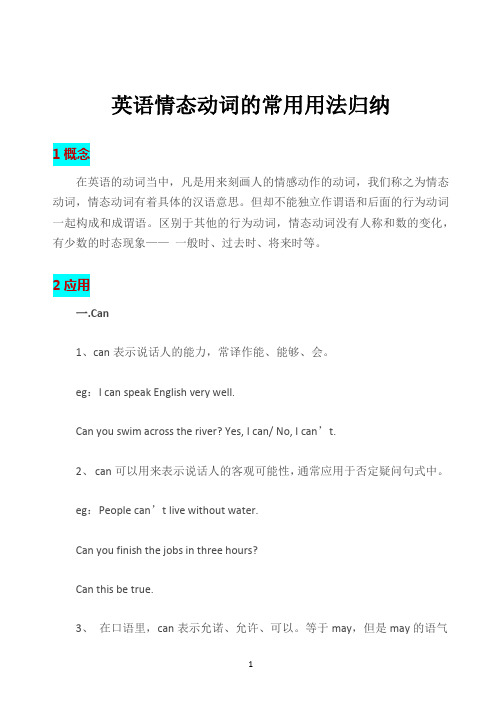
英语情态动词的常用用法归纳1概念在英语的动词当中,凡是用来刻画人的情感动作的动词,我们称之为情态动词,情态动词有着具体的汉语意思。
但却不能独立作谓语和后面的行为动词一起构成和成谓语。
区别于其他的行为动词,情态动词没有人称和数的变化,有少数的时态现象——一般时、过去时、将来时等。
2应用一.Can1、can表示说话人的能力,常译作能、能够、会。
eg:I can speak English very well.Can you swim across the river? Yes, I can/ No, I can’t.2、can可以用来表示说话人的客观可能性,通常应用于否定疑问句式中。
eg:People can’t live without water.Can you finish the jobs in three hours?Can this be true.3、在口语里,can表示允诺、允许、可以。
等于may,但是may的语气重于can。
eg:Can I come in? = May I come in?Can I use your bike? = May I use your bike ?*表示允许可以may mightcould can4、在“过去时”的语境里,通常用could 表示它的过去式,用be able to 短语(was/were)而could通常用来在一般现在时的语境里表示委婉语气eg:Could(can)you show me the way to the supermarket?5、can表示猜测(1)对现在状态的一种猜测,只能用在否定疑问句中。
eg:Zhang can’t be ill really?This can’t be done by him.(2)对现在动作的猜测eg: The boy can’t be telling lies.Mary works so hard, now, she can’t be sleeping.(3)对过去动作的一种猜测eg:He can’t have gone to the bookshop yesterday.Mother couldn’t have said it.6、can(could)惯用法(1)can’t wait to do 迫不及待做…….eg: Children can’t wait to eat apples in the basket.(2)can’t help doing 情不自禁做某事。
英语情态动词的用法总结

英语情态动词的用法总结情态动词是英语中一类特殊的动词,用来表示说话者的态度、推测、可能性、能力、许可和义务等。
情态动词包括can、could、may、might、must、shall、should、will、would、ought to等。
下面是关于英语情态动词用法的总结。
1. 表示能力和可能性:- can/could:表示能力和可能性,用于表达某人有能力做某事或某事有可能发生。
例如:“I can swim.”(我会游泳),“She could come to the party.”(她可能会来参加派对)。
- may/might:表示可能性,用于表示某事有可能发生,程度较can/could稍弱。
例如:“It may rain tomorrow.”(明天可能会下雨),“He might win the competition.”(他有可能赢得比赛)。
2. 表示推测和猜测:- must:表示推测,用于表示某事几乎可以肯定或有极大的可能性。
例如:“He must be tired.”(他肯定累了),“She must have forgotten about the meeting.”(她肯定忘记了会议)。
- may/might:表示推测,用于表示某事有可能发生或存在。
例如:“She may be busy.”(她可能很忙),“They might not know the answer.”(他们可能不知道答案)。
3. 表示许可和建议:- can/could:表示许可,用于表示某事是被允许的。
例如:“Can I borrow your pen?”(我可以借你的笔吗?),“Could you open the window, please?”(请你能开窗户吗?)。
- may/might:表示许可,用于礼貌地请求或征求对方的意见。
例如:“May I ask you a question?”(我可以问你一个问题吗?),“Might I suggest an alternative?”(我可以提出一个替代方案吗?)。
情态动词的用法总结
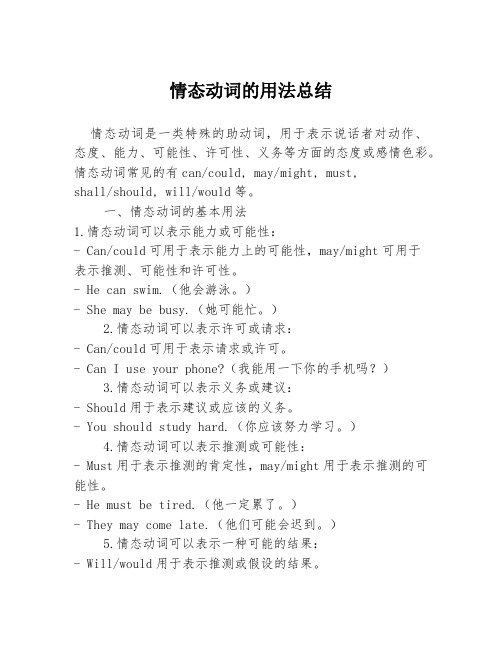
情态动词的用法总结情态动词是一类特殊的助动词,用于表示说话者对动作、态度、能力、可能性、许可性、义务等方面的态度或感情色彩。
情态动词常见的有can/could, may/might, must,shall/should, will/would等。
一、情态动词的基本用法1.情态动词可以表示能力或可能性:- Can/could可用于表示能力上的可能性,may/might可用于表示推测、可能性和许可性。
- He can swim.(他会游泳。
)- She may be busy.(她可能忙。
)2.情态动词可以表示许可或请求:- Can/could可用于表示请求或许可。
- Can I use your phone?(我能用一下你的手机吗?)3.情态动词可以表示义务或建议:- Should用于表示建议或应该的义务。
- You should study hard.(你应该努力学习。
)4.情态动词可以表示推测或可能性:- Must用于表示推测的肯定性,may/might用于表示推测的可能性。
- He must be tired.(他一定累了。
)- They may come late.(他们可能会迟到。
)5.情态动词可以表示一种可能的结果:- Will/would用于表示推测或假设的结果。
- If it rains, we will stay indoors.(如果下雨了,我们就呆在室内。
)二、情态动词的注意事项1.情态动词没有人称和数的变化,后面直接跟动词原形。
- He can play the piano.(他会弹钢琴。
)2.情态动词后面的动词一般用原形,表示动作和状态。
- I can swim.(我会游泳。
)- They should apologize.(他们应该道歉。
)3.情态动词用于疑问句时,直接将情态动词置于句首。
- Can you swim?(你会游泳吗?)4.情态动词用于否定句时,直接在情态动词前加"not"。
情态动词的用法总结

情态动词的用法总结情态动词是英语中一类特殊的动词,它们不表示动作,而是表示说话者对动作的态度,如肯定、否定、表示推测或可能性等。
在英语的语法结构中,情态动词占有重要的地位,并且在日常会话中比较常用。
下面就介绍一下情态动词的用法。
一、can的用法can最常见的用法是表示能力,即表示能够做某事,如:I can speak Chinese.我会说汉语。
也可以表示请求、允许或可能性,如:Can I borrow your pen?我可以借你的钢笔吗?Can we start the meeting now?我们现在可以开始开会吗?It can rain tomorrow.明天可能会下雨。
二、should的用法should表示建议、劝告或命令,如:You should read more books.你应该多读书。
You should not lie to your parents.你不应该对父母撒谎。
三、must的用法must表示必须,强调事情是不可以不做的,如:You must turn off the lights before leave the room.你离开房间之前必须关掉灯。
四、ought to的用法ought to相当于should,表示应该或建议,如:You ought to finish your homework before watching TV.你应该在看电视前把作业做完。
五、would的用法would常用来礼貌地表达请求、愿望或建议,如:Would you like a cup of tea?你想来杯茶吗?Would you like to go to the movies with me?你想和我一起看电影吗?六、could的用法could常用来表示可能性,也可以用来礼貌地表达请求,如: The weather could get worse later.天气以后可能会变得更糟糕。
(完整版)情态动词用法归纳(全)

2) need 作情态动词用时, 常用于疑问句、否定句。在肯定句 中一般用must, have to, ought to, should代替。
1.You needn’t come so early. 2. ---- Need I finish the work today?
---- Yes, you must. / No, you needn’t.
2) must是说话人的主观看法, 而have to则强调客观需要。 Must只有一般现在时, have to 有更多的时态形式。
1. I really must go now. 2. I had to work when I was your age.
三、 must, have to
3) 表示推测、可能性(只用于肯定的陈述句)
三、 must, have to
1) 表示必须、必要。 You must come in time. 在回答引出的问句时,如果是否定的,不能用mustn’t(禁止,
不准),而用needn’t, don’t have to(不必). ---- Must we hand in our exercise books today? ---- Yes, you must. ---- No, you don’t have to / you needn’t.
1. How dare you say I’m unfair? 2. He daren’t speak English before such a crowd, dare he? 3. If we dared not go there that day, we couldn’t get the beautiful
更多的时态。
情态动词的用法总结

情态动词的用法总结情态动词是一类特殊的动词,用来表示说话人对其中一种行为、状态或可能性的态度、判断、推测、愿望等情态。
情态动词有can,could,may,might,will,shall,should,would,must等。
它们在语法上有一些特殊的用法和用法限制。
以下是情态动词的用法总结:1.表示能力和许可:- Can/could:用来表示能力,做事的方式上拥有能力或技能。
例如:I can swim.(我会游泳。
)- May/might:用来表示允许或许可。
例如:May I go to the bathroom?(我可以去洗手间吗?)- Will/would:用来表示请求或许可。
例如:Would you please close the door?(你能关门吗?)2.表示推测和可能性:- May/might:用来表示推测、猜测或可能性。
例如:He may be at home.(他可能在家。
)- Could:用来表示一种可能性或假设的情况。
例如:He could bein the park.(他可能在公园。
)3.表示义务和必要性:- Must:用来表示义务、必要性或推测。
例如:You must finish your homework.(你必须完成作业。
)- Should:用来表示建议、责任或推测。
例如:You should apologize for your behavior.(你应该为你的行为道歉。
)4.表示愿望和偏好:- Would:用来表示过去或不太可能实现的愿望或偏好。
例如:I would love to go on vacation.(我很想去度假。
)需注意的是,情态动词具有一些特殊的用法和词语组合,例如情态动词后接动词原形、后接动词不定式的完成式形式等。
使用情态动词时需要根据具体语境和句子结构进行合理搭配与运用。
- 1、下载文档前请自行甄别文档内容的完整性,平台不提供额外的编辑、内容补充、找答案等附加服务。
- 2、"仅部分预览"的文档,不可在线预览部分如存在完整性等问题,可反馈申请退款(可完整预览的文档不适用该条件!)。
- 3、如文档侵犯您的权益,请联系客服反馈,我们会尽快为您处理(人工客服工作时间:9:00-18:30)。
---------------------------------------------------------------最新资料推荐------------------------------------------------------情态动词的详细用法归纳情态动词的用法归纳 can 类别用法举例能力 1. 能力人或物先天具备或后天习得的能力 I can climb this pole.The police are doing all they can to find her. He is only four, but he can read. 2. 结果与感官动词连用表示某种感官结果看见、听见、摸到、闻到、尝到等 (也是一种能力) Here they are I can see their car. Can yo u smell something burning? I can’t understand why you’re so upset.He can’t remember where he put the tickets. 容许 3. 允许给某人做某事的权力You can’t park here - it’s a no parking zone. ‘Can we go home now, please?’ ‘No you can’t.’Any police officer can insist on seeing a driver’s license. 可能性 4. 可能性多用于非肯定句表不可能或对可能性的怀疑(问句中),肯定句中表示理论/逻辑上的可能性I am confident that a solution can be found. There can be no doubt that he is guilty. Some packaging cartons can be stored flat. Can he still be alive after all this time? Facts prove that the worlds economic development is not a win-lose game but one in which all can be winners. Would you like to go swimming with me this afternoon? I’d love to. But I’m afraid I cant. I have too much work to do.5. 请求许可问某人有没有得到或做某事的可能性(用于口语) Can I have a cigarette, please? Can you help me1 / 8lift this box?6. 不相信用于否定句表示不相信某事的真实性 (也是一种可能性) This can’t be the right road. It can’t be easy caring for a man and a child who are not your own. He cant have finished writing the paper now. He hadnt written a single word when I left him ten minutes ago. 7. 不应该用于非肯定句表示某人不应该做某事 (不应该有这样的可能性) You can’t expect the world to change overnight. We can’tgo on like this. Jill’s left her husband, but can you blame her after the way he treated her?8. 惊讶、生气 (口语)非肯定句中表示对某种可能性可能性的惊讶、生气You can’t be serious! They can’t have arrived already, surely! How can you be so stupid! 9. 可能会表示有时候有发生某事的可能性 It can be quite cold here at night. Peter can be really annoying. 10. 吩咐口语中用来生气地吩咐某人做某事 (也是一种可能性) And you can stop that quarrelling, the pair of you. If you won’t keep quiet, you can get out. 11. 推测对某种可能性进行推测或怀疑;若是现在已经发生或过去发生的事则用 can + 不定式完成体 Michael cant be a policeman, for hes much too short.He had been knocking at the door for a long time, but no one came to open it, so he said to himself, No one can be indoors. The T-shirt you have taken by mistake cant be hers. She seldom wears red. David cant have gone far his coats still here. could 类别用法举例能力 1. 能力间接引语中表示过去具---------------------------------------------------------------最新资料推荐------------------------------------------------------ 备的能力 By the time she was eight, she could read Greek and Latin.I knew I cou ldn’t afford the rent.许可 2. 允许间接引语中表示过去给某人做某事的权力或表示现在被允许的较小可能性或更委婉 The teacher said we could all go home. If I couldnt plan to do anything I wanted to, Id like to go to Tibet and travel through as much of it as possible. 可能性 3. 可能性表示现在或将来的比 can 小的可能性 Most accidents in the home could be prevented. It couldbe weeks before we get a reply. If you’re not careful, you could get into even worse trouble.4. 可能性表示过去本有发生某事的可能性但没有发生 (本可能) Somebody could have been killed. I could have warned you if I had known where you were. He could have escaped, but he chose to stand and fight. 5. 强调感情口语中表示某人的某种感情的结果使得某人(现在或过去)有可能 Sometimes he irritates me so much I could scream.I was so angry I could have killed her. I was so relieved I could have kissed them all.6. 请求许可问现在有没有得到或做某事的可能性(用于口语,比 can 更客气) Could you help me with these boxes? Could I have a drink of water, please? How about Sam? Could he come along too? I wonder if I could just ask you to sign this. 7. 建议建议句中主语做某事 (也是一种可能性)You could ask your doctor for a check-up.3 / 8You couldalways try phoning her at the office. Maybe we could get together sometime next week? Couldn’t you get one of your friends to help you?8. 恼火口语中对某人(不)可能做某事感到恼火 You could have told me you were going to be late (=you should have told me but you did not)! You could at least say that you’re sorry.How could you be so stupid! 9. 强调语气否定形式+比较级表示对某种可能性的强调Their lifestyles couldn’t be more different. ‘ How are things?’ ‘Fine! Couldn’t be better.’ Ordering on-line couldn’t be simpler. You could have been more careful. 10. 客气英国英语口语中表示吃/喝不下(可能性)’Would you like another piece of pie?’ ‘Oh, no thanks, I couldn’t.’11. 推测对可能性的怀疑或推测,可能性比 can 小;若表示本可能而事实上没有做则用 can / could+不定式完成体 Who could it be that stole my pen? Ive taken someome elses green sweater by mistake. It could be Harrys. He always wears green. He paid for a seat, when he could have entered free. I cant remember when we went to Nanjing, but could it have been sometime last summer? may 类别用法举例许可 1. 允许表示给某人做某事的权力;问句中表示委婉礼貌地请求允许句中主语做某事 Thank you. You may go now. There is a set of rules to show what members may and may not do. You may sit down or stand, just as you wish. No one may own more than 10%---------------------------------------------------------------最新资料推荐------------------------------------------------------of the shares. May I come in and wait? May we use your office for a few minutes? 2. 口语中表示礼貌的建议、询问(也是一种允许) All these things, if I may say so, are entirely irrelevant. Who, may I ask, is Wotherspoon? May I suggest that you consider the matter further before taking any action. 可能性 3. 可能性肯定句中表示存在某事发生的事实上的可能性 I may be late, so don’t wait for me. Some chemicals maycause environmental damage. There may not be enough money to pay for the repairs. It may be that Minoan ships were built and repaired here. The problem may be solved in a number of different ways. Helen may go on the trip with us, but she isnt quite sure yet. Every coin has two sides. Beautiful songs, sometimes, may be just noise to others.4. 建议口语中,may as well 表示建议句中主语应该做某事/没有理由不做某事/还是怎样为好If there’s nothing more to do, we may as well go to bed.You may as well tell us now - we’ll find out sooner or later.5. 祝愿/希望正式场合表示对主语的祝愿/希望 We pray for those who died may they rest in peace. It is a fine tradition and long may it continue! May peace return to the troubled land!6. 目的状语从句中表示使某事成为可能(正式场合)The hero sacrifices his life so that his friend may live. 7. may well表示完全有理5 / 8由做某事(很可能);may as well 口语中表示建议某人还是做某事好What’s all the noise?’ ‘You may well ask.’ Users may wellvisit some of the other services. If there’s nothing more to do, we may as well go to bed. You may as well tell us now we’ll find out sooner or later.8. 推测陈述句中表示对某事发生的事实可能性进行推测,若对已经发生了或过去发生的事进行事实上的可能性的推测,则用 may + 不定式完成体Well, I may have been wrong. They may have called while you were out. Spencer says Clinton may have done work to improve looks. North Korea may have done nuclear test.9.尽管有某种可能性 I may be slow, but at least I don’t make stupid mistakes. Although this may sound like a simple process, great care is needed. Strange as it may seem, I always felt I belonged here. might 类别用法举例允许 1. 英国英语口语中礼貌得请求对方允许主语做某事Might I borrow your pen? I wonder if I might speak to your son.2. 间接引语中表示请求允许 He asked if he might come in and look around. 建议 3. 建议礼貌得建议做某事 If you need more information, you might try the Internet.I thought we might go to the new Chinese restaurant on the High Street. It might be a good idea to put those plants in the shade. 可能性 4. 说话人没有把握的、现在或将来发生或出现的情况的可能性 I might be a few minutes late. She might not want to come with us. I---------------------------------------------------------------最新资料推荐------------------------------------------------------ suppose he might have missed the train. This might well be her last public performance. One of the guards might easily panic and shoot someone. 5. 间接引语中作为 may 的过去式表示过去的可能性 George said he might be able to help you. I thought they might have gone home. She was worried that we might get hurt.6. 表示过去本可能但事实上没有发生/出现的情况 It was terrifying. We might have been killed. 7. 说话人对某人没有做他认为应该做的事感到恼怒 You might at least say thank you. They might have cleaned up before they left.8. 间接引语中的目的状语从句中表示一种可能性 I asked for names and addresses so that I might pass on details to the police.9. might I say/ask/add 等在英国英语口语中表示礼貌得提出自己的意见、问题 Might I ask how old you are? Might I just say how lovely it is to see everyone here today. 10. might (just) as well 表示建议某人做某事 I suppose we might as well go home. 11. might well 表示句中主语完全有理由做某事He might well have quoted the rest of Mr. Lincoln’s sentence. Otherwise, his base might well decide that it does not make a difference who gets elected and stay home.12. 尽管有某种可能性He might be nearly seventeen but he’s still very immature. Surprising as it might seem, some tourists actually enjoy the British weather. Although she might7 / 8understand his beliefs, she could not accept them. Try as I might, I couldn’t work out the answer. will 类别用法举例 1. 2. 3. 4. 5. 6. 7. 8. 9. 10. 11.12.。
